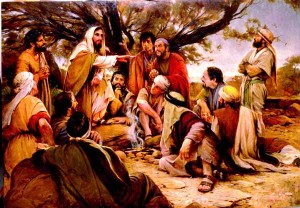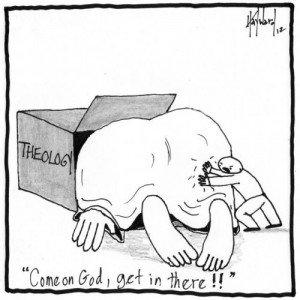From the Book of Ruth:
In the days when the judges ruled, there was a famine in the land, and a certain man of Bethlehem in Judah went to live in the country of Moab, he and his wife and two sons. The name of the man was Elimelech and the name of his wife Naomi, and the names of his two sons were Mahlon and Chilion; they were Ephrathites from Bethlehem in Judah. They went into the country of Moab and remained there. But Elimelech, the husband of Naomi, died, and she was left with her two sons. These took Moabite wives; the name of one was Orpah and the name of the other Ruth. When they had lived there for about ten years, both Mahlon and Chilion also died, so that the woman was left without her two sons or her husband.
(From the Daily Office Lectionary – Ruth 1:1-5 (NRSV) – May 20, 2013.)
 And there you have it, ten years in the lives of six people, and the deaths of three of them, put to rest in five short Bible verses. As Antonio said to Sebastian, “What’s past is prologue” (The Tempest, Act 2, Scene 1) and for the author of Ruth apparently not very interesting prologue. The storyteller is (pardon the pun) ruthlessly efficient in his introduction (I assume the author was “he” – maybe not). He clears away the unnecessary detail of sixty “person-years” of life to set the stage for what is to follow.
And there you have it, ten years in the lives of six people, and the deaths of three of them, put to rest in five short Bible verses. As Antonio said to Sebastian, “What’s past is prologue” (The Tempest, Act 2, Scene 1) and for the author of Ruth apparently not very interesting prologue. The storyteller is (pardon the pun) ruthlessly efficient in his introduction (I assume the author was “he” – maybe not). He clears away the unnecessary detail of sixty “person-years” of life to set the stage for what is to follow.
When I realized that, it hit me pretty hard. I’m sixty years old! Could the sum-total of my life be as easily summarized and shuffled off simply as prologue for something else? I suppose it could, but I would hope not.
Recently I was at a gathering with a bunch of other clergy and at some point during our deliberations comments were made about the use and organization of time; someone else made a remark about how we compartmentalize the different areas of our lives; and then I heard someone say something about a magazine. I have to be honest and admit that (a) I wasn’t paying close attention and (b) I don’t know if these comments were all made in the context of the same conversation. In my head, though, they merged into a rumination about Time magazine as a metaphor for a human life.
I used to be a very faithful subscriber to and reader of Time magazine. I took out my first subscription when I was in high school (1967) and didn’t stop subscribing until I attended seminary in 1991. And before that, my parents and my brother had been subscribers, so I’d been reading that magazine for a long time. It didn’t change much in all those years and I suppose it still hasn’t, at least insofar as the magazine is organized.
The classic issue of Time magazine is a study in compartmentalization. There are “departments” for all the areas of news, or if you prefer the areas of life (although Life is a different, if related publication): U.S., World, Politics, Sports, Lifestyle, Religion, Fashion, Tech, Science, and so forth. Which departments appeared in a given weekly issue depended on what was making news that week. There were always overlaps between these departments, of course, and I suppose the editors would have to determine if a story about regulation of new oil technologies fit better under Politics or Tech or Science; one would guess that the decision would be based on which subject predominates.
Life (life, not Life magazine) is a lot like a Time magazine. We have “departments” – Family, Job, School, Church, Friends, Hobbies, Politics, and so forth – and somehow, like the editors of Time magazine, we decide how all the stories of our lives get organized. We decide what order they are put in and how, like the magazine, they are arranged; we put some things closer to the front cover of our lives, where the public is most apt to see them, and other things we bury in the back pages. Then stories are neatly bound for our presentation of self to the world.
Time magazines were held together with staples through the spines. Sometimes, the pages would come loose from the staples. First, the four center pages would come away. You’d put them back in and hope the magazine would hang together until you finished reading all the articles of interest, but it wouldn’t always work out that way. Sometimes someone would take the magazine apart because they needed a picture for a school report, or wanted to send an article to someone in a letter, or whatever . . . sometimes the staple would get pulled out or work its way out on its own, and then all the pages would be loose. If you weren’t careful, the pages would get mixed up in a mishmash. As you were sitting out by the pool, a breeze would come along and blow them away, and you’d chase them across the yard hoping to gather them all. Some would blow into the pool and get soaking wet; some would blow into the neighbor’s yard on the other side of the fence and you couldn’t get them because of the vicious dog; some would take flight and get caught in the branches of trees. The articles would be all jumbled and some pages would be missing and the stories would be incomplete and not make sense.
And sometimes life can be a lot like that unstapled, jumbled, blown apart, partly missing, chaotic Time magazine, too.
Suppose someone actually did report on everything you did everyday for a week, on every work related task, about every friend or co-worker or family member with whom you talked, on every school assignment, every leisure activity, every television program you watched, on everything. Suppose they wrote it all out, organized it into departments, bound it with a staple, and produced a magazine of your week. Suppose they did that every week. Suppose those magazines were stacked week after week, month after month, year after year. Can you visualize those stacks? Can you see the piles and piles of magazines with your face and your name on the cover like the Time magazine Person of the Year?
Now think about this . . . if Antonio was right that “what’s past is [simply] prologue” and some storyteller were going to summarize what’s in those stacks of magazines, those piles of stories as foreword to a new story, would five verses be enough? Do you think it could even be done in a way that would honor your existence? I don’t.
I think life is a lot more like Time magazine and a lot less like the introduction to the Book of Ruth! And I believe the Author of life is a lot more interested in the stories of our lives than the author of Ruth was in the stories of Elimelech, Mahlon, and Chilion. And for that, I’m grateful.
====================
A request to my readers: I’m trying to build the readership of this blog and I’d very much appreciate your help in doing so. If you find something here that is of value, please share it with others. If you are on Facebook, “like” the posts on your page so others can see them. If you are following me on Twitter, please “retweet” the notices of these meditations. If you have a blog of your own, please include mine in your links (a favor I will gladly reciprocate). Many thanks!
====================
Father Funston is the rector of St. Paul’s Episcopal Church, Medina, Ohio.
 What does it mean to believe? That is really the crux of the matter and the stumbling block for 21st Century folks. In modern American English, the dictionary tells us, the the verb to believe means, “to accept a statement, supposition, or opinion as true.” Is this what Jesus is saying to the Jewish authorities in the Jerusalem Temple? “I have told you and you do not accept my statements, suppositions, and opinions as true.” Somehow, I don’t think so.
What does it mean to believe? That is really the crux of the matter and the stumbling block for 21st Century folks. In modern American English, the dictionary tells us, the the verb to believe means, “to accept a statement, supposition, or opinion as true.” Is this what Jesus is saying to the Jewish authorities in the Jerusalem Temple? “I have told you and you do not accept my statements, suppositions, and opinions as true.” Somehow, I don’t think so. These may be my favorite words from the pen of the Apostle Paul. My mentor during my education for ordained ministry, who also became my first boss after ordination, often referred to these verses and would add, “Not even ourselves.”
These may be my favorite words from the pen of the Apostle Paul. My mentor during my education for ordained ministry, who also became my first boss after ordination, often referred to these verses and would add, “Not even ourselves.” Mark, Matthew, and John all report that on another occasion Jesus commented, “Prophets are not without honor except in their own country and in their own house.” One can’t get much more dishonored that being accused of being crazy!
Mark, Matthew, and John all report that on another occasion Jesus commented, “Prophets are not without honor except in their own country and in their own house.” One can’t get much more dishonored that being accused of being crazy! As I read the lesson from Exodus today, there is a bush in my dining room. It’s a four-foot tall evergreen and it’s sort of burning. There are little electrical lights all ablaze all over it. It’s our Christmas tree. (We have a short Christmas tree set on a table because we have three cats. We tried for a couple of years to have a normal size seven-foot tree with these guys, but it was impossible. So, small tree on table.)
As I read the lesson from Exodus today, there is a bush in my dining room. It’s a four-foot tall evergreen and it’s sort of burning. There are little electrical lights all ablaze all over it. It’s our Christmas tree. (We have a short Christmas tree set on a table because we have three cats. We tried for a couple of years to have a normal size seven-foot tree with these guys, but it was impossible. So, small tree on table.) Day before yesterday, I had a pretty good day in my ministry as rector of my parish. An Episcopal Church Women event went very well; we all had fun in what we were doing. I got home in the late afternoon and took care of a couple of personal matters, called my wife about the possibility of a “date night,” and when she said “Yes” I made reservations for dinner. I took the dog for a walk and, after my wife got home from work, we went out to dinner at our favorite local restaurant. When we returned home, I turned on my computer, checked my email, took a look at Facebook . . . and learned that Deb, a long time friend, a singer of great skill, and an occasionally very funny woman had passed away. It more than ruined the day.
Day before yesterday, I had a pretty good day in my ministry as rector of my parish. An Episcopal Church Women event went very well; we all had fun in what we were doing. I got home in the late afternoon and took care of a couple of personal matters, called my wife about the possibility of a “date night,” and when she said “Yes” I made reservations for dinner. I took the dog for a walk and, after my wife got home from work, we went out to dinner at our favorite local restaurant. When we returned home, I turned on my computer, checked my email, took a look at Facebook . . . and learned that Deb, a long time friend, a singer of great skill, and an occasionally very funny woman had passed away. It more than ruined the day. Do you ever wish someone whom you respect and admire hadn’t said what they said, because what they said is so hard to explain to someone who doesn’t respect and admire them, and what they said just sounds wrong, even to you? Then you know how I feel about the last response of Jesus in this conversation with Peter!
Do you ever wish someone whom you respect and admire hadn’t said what they said, because what they said is so hard to explain to someone who doesn’t respect and admire them, and what they said just sounds wrong, even to you? Then you know how I feel about the last response of Jesus in this conversation with Peter! It may be the United States’ holiday of Thanksgiving Day, but the Daily Office continues at this time of year delivering its message of repentance rather than encouraging thanksgiving. The Old Testament lesson is another from Malachi in which the Lord speaking to the priests says that he has spread dung on their faces and put them out of his presence! The gospel lesson from Luke has Jesus predicting the end of the world. And then there’s this epistle lesson which condemns the wealthy. Just not a lot of giving thanks!
It may be the United States’ holiday of Thanksgiving Day, but the Daily Office continues at this time of year delivering its message of repentance rather than encouraging thanksgiving. The Old Testament lesson is another from Malachi in which the Lord speaking to the priests says that he has spread dung on their faces and put them out of his presence! The gospel lesson from Luke has Jesus predicting the end of the world. And then there’s this epistle lesson which condemns the wealthy. Just not a lot of giving thanks!




















